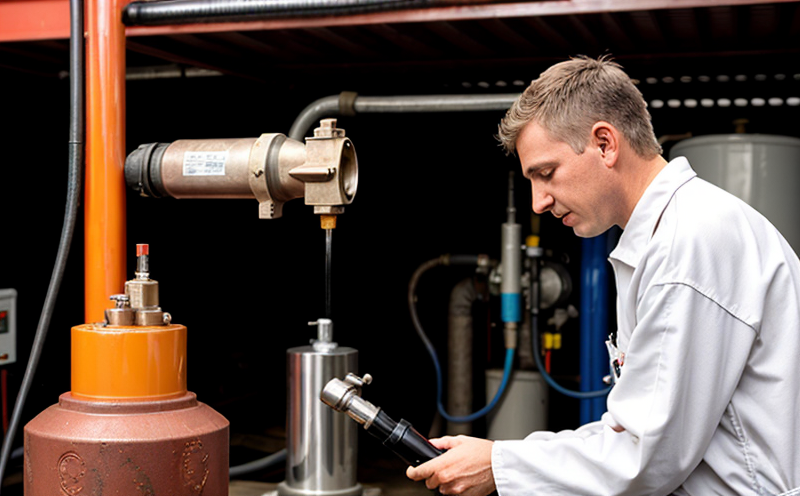ASTM D7566 Synthetic Jet Fuel (SAF) Quality Testing
The ASTM D7566 standard is pivotal in ensuring the quality and reliability of synthetic aviation fuels, or SAFs. These fuels are critical for reducing carbon emissions without compromising on performance. The testing outlined by this standard includes a comprehensive suite of analyses designed to assess various physical and chemical properties.
ASTM D7566 covers numerous tests that evaluate key fuel characteristics such as density, distillation range, flash point, cetane number (for diesel-based SAFs), sulfur content, water-soluble oxygenates, biofuel content, and more. This standard also specifies methods for determining the presence of contaminants like metals, particulates, and water.
The testing process starts with sample preparation, where fuel samples are taken from storage tanks or shipping containers and stored under controlled conditions to prevent contamination. The samples undergo a series of tests that require precise instruments such as gas chromatographs, distillation apparatuses, and calorimeters.
For instance, the distillation range test provides critical insights into the volatility and energy content of the fuel. This is essential for ensuring that the fuel behaves correctly under various operating conditions in aircraft engines. Similarly, the flash point test assesses the safety margin by determining the lowest temperature at which the vapor can ignite.
The sulfur content analysis ensures compliance with environmental regulations while biofuel content testing verifies the integrity of blended fuels. Water-soluble oxygenate tests are crucial for tracking the quality of renewable components in SAFs, ensuring they meet sustainability goals without sacrificing performance.
Once all tests are completed, the results are meticulously recorded and compared against ASTM D7566 standards. Any deviations from these standards indicate potential issues that must be addressed to maintain fuel quality and safety. This process is essential for both R&D engineers who need accurate data on new fuel formulations and compliance officers ensuring regulatory adherence.
ASTM D7566 testing not only ensures the quality of SAFs but also contributes significantly to reducing carbon footprints in aviation. By adhering to these stringent standards, airlines can operate more sustainably while maintaining high levels of performance and safety. This is particularly important as the aviation industry seeks to decarbonize its operations.
In summary, ASTM D7566 synthetic jet fuel testing is a cornerstone for ensuring that SAFs meet all necessary quality and reliability criteria. It plays a vital role in the development, production, and use of sustainable fuels in the aerospace sector, supporting both environmental goals and operational efficiency.
Quality and Reliability Assurance
- Consistency: ASTM D7566 ensures consistent fuel performance across different batches by establishing clear standards for key parameters.
- Safety: By rigorously testing flash point, distillation range, and other critical properties, the standard enhances aviation safety.
- Environmental Impact: The tests ensure that fuels comply with environmental regulations, thus minimizing their ecological footprint.
- Reliability: Continuous quality assurance through ASTM D7566 helps maintain fuel reliability in diverse operational conditions.
The comprehensive nature of ASTM D7566 ensures that synthetic jet fuels meet the highest standards of performance and safety. This is crucial for maintaining reliable operations across the aviation industry, where even minor deviations can have significant consequences.
Environmental and Sustainability Contributions
The testing under ASTM D7566 synthetic jet fuel standard directly contributes to environmental sustainability by ensuring that fuels meet stringent quality criteria. By adhering to these standards, the aviation industry can reduce its carbon footprint while maintaining operational efficiency.
Synthetic aviation fuels (SAFs) are designed to have lower greenhouse gas emissions compared to conventional fossil-based fuels. However, their effectiveness in reducing carbon emissions depends on meeting strict quality parameters. ASTM D7566 testing ensures that these fuels meet the necessary standards for both performance and environmental impact.
For instance, biofuel content analysis under ASTM D7566 helps track the sustainability of blended SAFs. The presence of water-soluble oxygenates is a key indicator of renewable components in the fuel. By ensuring these components are accurately measured, ASTM D7566 supports the development of more sustainable aviation fuels.
The standard also plays a role in reducing operational costs by ensuring that fuels perform reliably under various conditions. This reliability translates to reduced downtime and maintenance costs for airlines. By maintaining high-quality synthetic jet fuel, operators can ensure their fleets are always ready for takeoff, minimizing disruptions due to fuel-related issues.
In conclusion, ASTM D7566 synthetic jet fuel testing is not just about compliance; it's a step towards sustainable aviation. By ensuring that fuels meet the highest quality standards, this testing supports the industry’s transition towards more environmentally friendly operations.
Competitive Advantage and Market Impact
The ability to ensure consistent fuel quality through ASTM D7566 synthetic jet fuel testing provides a competitive advantage in the aviation sector. Airlines that adhere strictly to these standards can offer safer, more reliable services while meeting environmental targets.
Compliance with ASTM D7566 is increasingly becoming a differentiator in the market. Airlines and aerospace companies that demonstrate their commitment to quality and sustainability through rigorous testing are likely to attract a broader customer base. This is particularly true as global regulations become more stringent, favoring sustainable practices.
Moreover, adherence to these standards can lead to operational cost savings. By ensuring fuel reliability, airlines can minimize the risk of engine failures or other issues that could result in costly repairs and maintenance. This not only enhances safety but also contributes to long-term cost efficiency.
The demand for sustainable aviation fuels is growing, driven by both regulatory pressures and corporate sustainability goals. Airlines that are proactive in adopting ASTM D7566 synthetic jet fuel testing can position themselves as leaders in the market. This proactive approach can attract investors interested in supporting eco-friendly initiatives and meet customer expectations for environmentally responsible operations.
In conclusion, ASTM D7566 synthetic jet fuel testing is more than just a compliance requirement; it’s a strategic choice that enhances competitive positioning and supports sustainable growth in the aviation industry.





